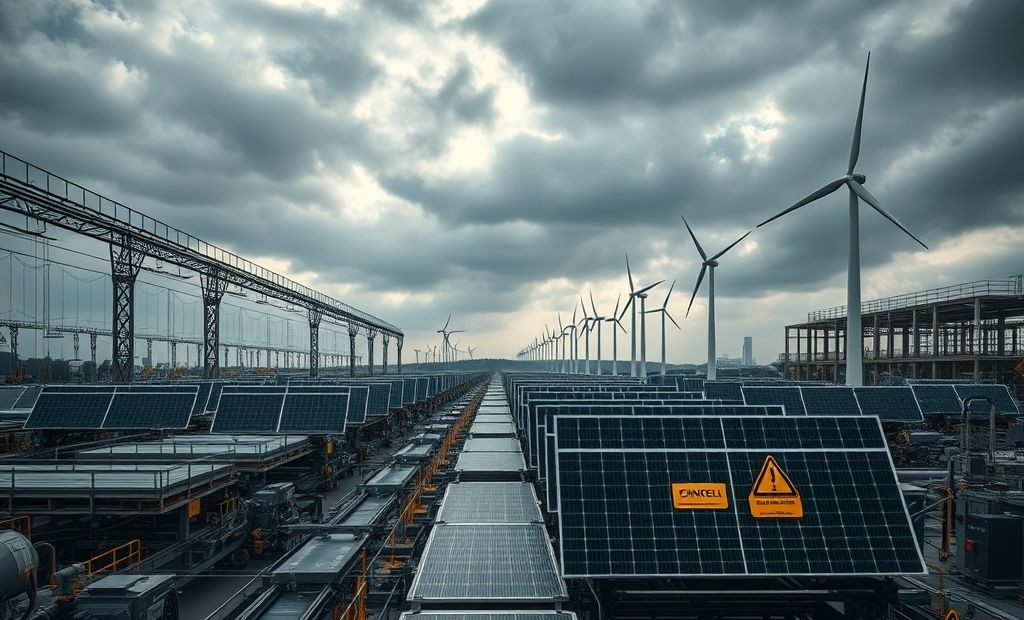US Manufacturing Investments Face Clean Tech Setbacks

US Manufacturing Investment Stumbles Amid Clean Tech Project Cancellations Manufacturing investments in the United States are experiencing a slowdown, primarily due to cancellations in clean...
⏱️ Estimated reading time: 3 min
Latest News
US Manufacturing Investment Stumbles Amid Clean Tech Project Cancellations
Manufacturing investments in the United States are experiencing a slowdown, primarily due to cancellations in clean technology projects. This downturn raises concerns about the future of sustainable manufacturing and its impact on the overall economy. Several factors contribute to this trend, affecting both established companies and new ventures aiming to capitalize on the growing demand for green technologies.
Factors Contributing to the Investment Slowdown
Project Cancellations
A significant reason for the investment slump is the cancellation of several high-profile clean tech manufacturing projects. Companies often cite economic uncertainty, regulatory hurdles, and shifts in government incentives as primary drivers for these decisions.
Economic Uncertainty
Fluctuations in the global economy and evolving market conditions have created an environment where businesses are hesitant to commit to large-scale investments. This uncertainty particularly affects projects with long-term return horizons, typical of clean tech manufacturing.
Regulatory Hurdles
Navigating the complex web of federal, state, and local regulations poses a significant challenge for manufacturers. The permitting process, environmental compliance standards, and ever-changing policies can delay projects and increase costs, deterring investment. For example, changes in environmental regulations can significantly impact the viability of manufacturing projects.
Shifting Government Incentives
Government incentives, such as tax credits and grants, play a crucial role in attracting manufacturing investments. However, when these incentives are reduced or become unreliable, companies may reconsider their investment plans. The inconsistent nature of these incentives adds to the overall uncertainty, impacting long-term financial planning.
Impact on Clean Technology Manufacturing
Job Creation
The slowdown in manufacturing investments directly impacts job creation in the clean technology sector. Reduced investments translate to fewer new factories, fewer expansions, and ultimately, fewer employment opportunities. This slowdown can have ripple effects throughout local economies that rely on these jobs.
Innovation
Decreased investment also stifles innovation in clean technology. Without sufficient funding, companies struggle to develop and scale new technologies, hindering progress towards a more sustainable future. Innovation requires substantial capital, and investment setbacks can delay crucial research and development efforts.
Global Competitiveness
The US risks falling behind other nations in the global race for clean technology leadership if manufacturing investments continue to decline. Countries with more stable and supportive investment climates may attract companies and projects that would otherwise locate in the US, diminishing America’s competitive edge. To remain competitive, the US must foster a more attractive environment for clean tech manufacturing.
Addressing the Challenges
Stable Policy Frameworks
Creating stable and predictable policy frameworks is essential to encourage manufacturing investments. Governments can provide clarity and assurance by establishing long-term environmental and economic policies that support sustainable manufacturing.
Streamlined Regulations
Streamlining regulatory processes can reduce the burden on manufacturers, making it easier for them to navigate the permitting process and comply with environmental standards. Efficient and transparent regulations can significantly lower project costs and timelines.
Consistent Incentives
Maintaining consistent and reliable government incentives is crucial for attracting and retaining manufacturing investments. Long-term tax credits, grants, and other financial support mechanisms can provide the necessary stability for companies to make long-term investment decisions.
Related Posts

AI in 2026 How Intelligent Agents Are Becoming Trusted Work Partners
In 2026, artificial intelligence has transcended its role as a mere productivity booster, emerging as...
February 4, 2026
Bluesky Enhances Moderation for Transparency, Better Tracking
Bluesky Updates Moderation Policies for Enhanced Transparency Bluesky, the decentralized social network aiming to compete...
December 11, 2025

Google Maps: Gemini Tips, EV Charger Predictions & More!
Google Maps Gets Smarter: Gemini Tips & EV Updates Google Maps is enhancing user experience...
December 9, 2025
1 Comment
-
bn
Your point of view caught my eye and was very interesting. Thanks.










Your point of view caught my eye and was very interesting. Thanks.